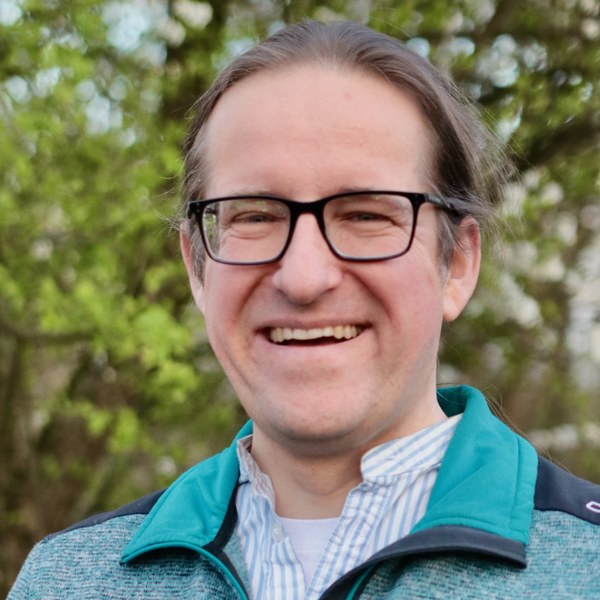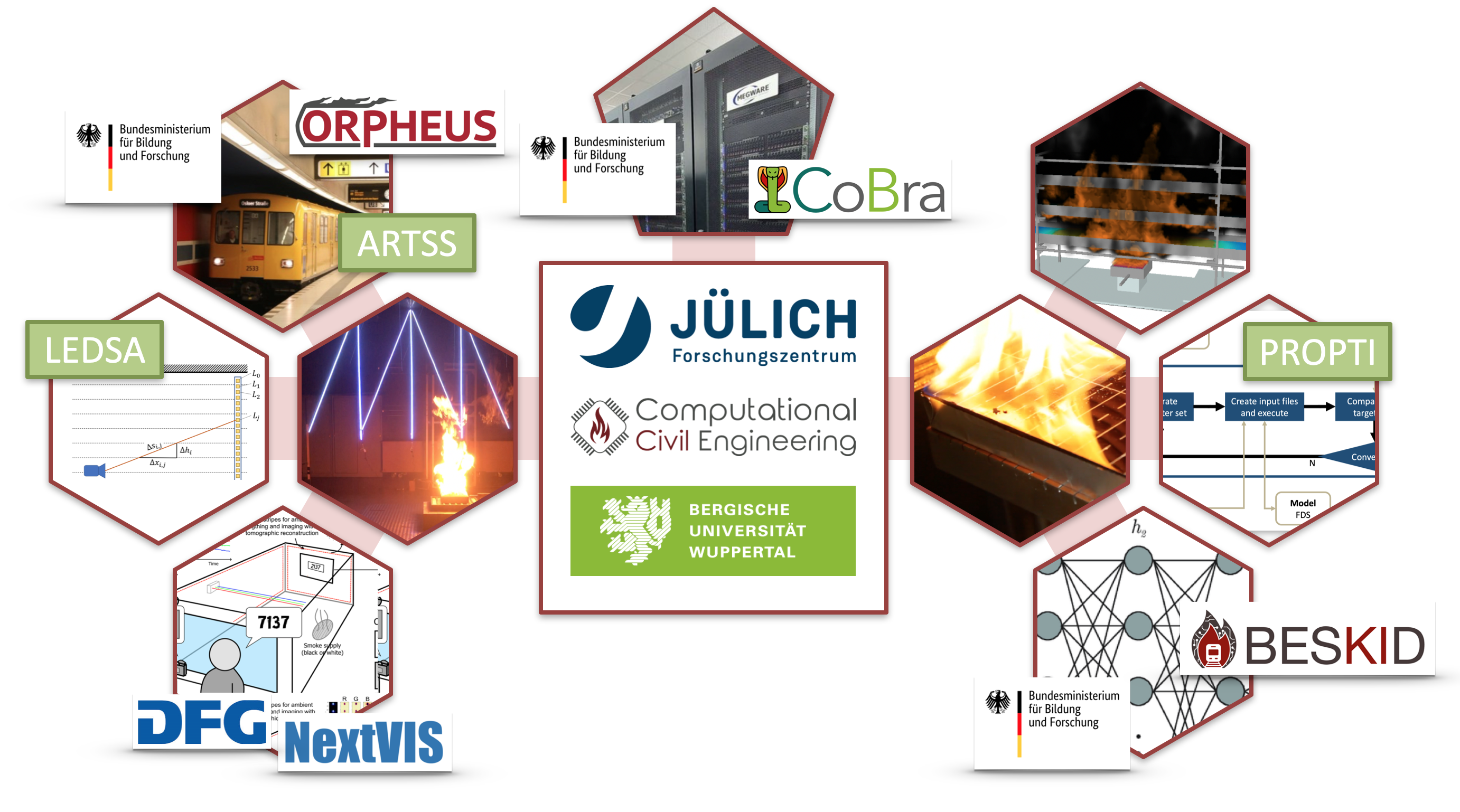
Prof. Dr. Lukas Arnold
Head of the division
Fire Dynamics
Address
Forschungszentrum Jülich GmbH
Wilhelm-Johnen-Straße
52428 Jülich
Institute for Advanced Simulation (IAS)
Civil Safety Research (IAS-7)
Building 09.7 / Room 317
Profile
Research Focus

My main research activities cover:
- Development of new numerical methods in the field of fire dynamics
- Visibility and flame spread modelling with the Fire Dynamics Simulator (FDS)
This research is in close collaboration with my chair "Computational Civil Engineering" at the University of Wuppertal. A short curriculum vitae is available here.
Visibility in Fire

In case of fire, one of the threads is the inhabited perception of evacuation signs. With our research we aim to understand the involved physical phenomena (light-smoke interaction) and the human perception of signs. For this, we conduct real-scale fire experiments and develop new theoretical models. All this leads to a better, i.e. more realistic, numerical prediction in CFD-based simulation models and smoke representation in VR.
Applied methods:
- Experimental: Room Scale Fires following EN 54, Optical Cameras, MIREX, ELPI+
- Theoretical: Tomography, Mie-Theory, Image Processing, Ray-Tracing
Selected fundamental publications (all open access):
- "Remote sensing of the light-obscuring smoke properties in real-scale fires using a photometric measurement method", Kristian Börger, Alexander Belt, Thorsten Schultze and Lukas Arnold, Fire Technology, 2024, DOI:10.1007/s10694-023-01470-z
- "Extinction coefficients from aerosol measurements", Christoph Gnendiger, Thorsten Schultze, Kristian Börger, Alexander Belt and Lukas Arnold, Fire Safety Journal, 2024, DOI:10.1016/j.firesaf.2024.104110
- "Assessing performance of LEDSA and Radiance method for measuring extinction coefficients in real-scale fire environments", Kristian Börger, Jennifer Ellingham, Alexander Belt, Thorsten Schultze, Stefan Bieder, Elizabeth Weckman and Lukas Arnold, Fire Safety Journal, 2023, DOI:10.1016/j.firesaf.2023.103929
- "Spatiotemporal measurement of light extinction coefficients in compartment fires", Lukas Arnold, Alexander Belt, Thorsten Schultze and Lea Sichma, Fire and Materials, 2021, DOI:10.1002/fam.2841
Selected application-oriented publications (all open access):
- "A waypoint based approach to visibility in performance based fire safety design", Kristian Börger, Alexander Belt and Lukas Arnold, Fire Safety Journal, 2024, DOI:10.1016/j.firesaf.2024.104269
- "A map representation of the ASET-RSET concept", Benjamin Schröder, Lukas Arnold and Armin Seyfried, Fire Safety Journal, 2021, DOI:10.1016/j.firesaf.2020.103154
- "Knowledge-and Perception-based route choice modelling in case of fire", Benjamin Schröder, David Haensel, Mohcine Chraibi, Lukas Arnold, Armin Seyfried and Erik Andresen, Human Behaviour in Fire, 2015, LINK
Flame Spread

The prediction of the cause of a fire, thus the spread of it, is one of the major challenges in fire safety science. It allows to determine the dynamics of the fire under consideration of the relevant physical and chemical processes, and especially the behaviour of the burning material. We conduct experiments on the micro scale to understand the pyrolysis of the material, i.e. the thermal decomposition, to determine the relevant material parameter. With these, we utilise computation fluid dynamics models to predict the flame spread in large scale experiments.
Applied methods:
- Experimental apparatuses: TGA, MCC, Cone Calorimeter, Tube Furnace, Real-Scale Fire Experiments
- Experimental diagnostics: IR Thermography, PIV, LDA
- Theoretical techniques: Computational Fluid Dynamics, Pyrolysis Modelling, Inverse Modelling, Multivariate Global Sensitivity Analysis
- Computational Hardware: High Performance Systems at BUW (Pleiades) and at FZJ (JURECA)
Selected experimental publications (all open access):
- "The Tube Furnace with Online Mass Loss Measurement as a New Bench Scale Test for Pyrolysis", Karen De Lannoye, Alexander Belt, Ernst-Arndt Reinecke and Lukas Arnold, Fire Technology, 2024, DOI:10.1007/s10694-024-01590-0
- "The influence of experimental conditions on the mass loss for TGA in fire safety science", Karen De Lannoye, Corinna Trettin, Alexander Belt, EA Reinecke, Roland Goertz and Lukas Arnold, Fire Safety Journal, 2024, DOI:10.1016/j.firesaf.2023.104079
Selected theoretical publications (all open access):
- "Sensitivity analysis for an effective transfer of estimated material properties from cone calorimeter to horizontal flame spread simulations", Tássia LS Quaresma, Tristan Hehnen and Lukas Arnold, Fire Safety Journal, 2024, DOI:10.1016/j.firesaf.2024.104116
- "PMMA pyrolysis simulation–from micro-to real-scale", Tristan Hehnen and Lukas Arnold, Fire Safety Journal, 2023, DOI:10.1016/j.firesaf.2023.103926
- "Inverse modelling of pyrolization kinetics with ensemble learning methods", Patrick Lauer, Lukas Arnold and Fabian Brännström, Fire Safety Journal, 2023, DOI:10.1016/j.firesaf.2023.103744
- "Numerical Fire Spread Simulation Based on Material Pyrolysis—An Application to the CHRISTIFIRE Phase 1 Horizontal Cable Tray Tests", Tristan Hehnen, Lukas Arnold and Saverio La Mendola, Fire, 2020, DOI:10.3390/fire3030033
- "Application cases of inverse modelling with the PROPTI framework", Lukas Arnold, Tristan Hehnen, Patrick Lauer, Corinna Trettin and Ashish Vinayak, Fire Safety Journal, 2019, DOI:10.1016/j.firesaf.2019.102835
Publications
The full list of Lukas Arnold's publications is available here:
Projects
These are the recent major third-party funded projects, in which I was involved in as a PI:
- 2022 – 2025, BMBF, "BESKID – Design fire simulation in railway vehicles using AI-based data"
- 2023 – 2026, DFG, "NextVIS – Next Generation Visibility Prediction Framework"
- 2023 – 2025, State NRW, "BCD – Building Blocks for Computer-aided Data Analysis"
- 2020 – 2023, BMBF, "CoBra – Simulation Laboratory and HPC-Cluster for Computer-Aided Fire Simulations"
- 2018 – 2021, BMBF, "KapaKrit – Optimisation of Trafic Capacities of Train Stations in Case of Large Scale Disasters"
- 2015 – 2018, BMBF, "ORPHEUS – Optimisation of the Smoke Control and Evaluation in Underground Stations: Experiments and Simulations"
Teaching
My teaching covers the following lectures at the University of Wuppertal:
- Computer Science (Bachelor Civil Engineering)
- Fire Simulations (Master Civil Engineering, Master Safety Engineering, Master Computer Simulation in Science)
- Data Analysis with Python (Master Civil Engineering)
In addition, I organise a bi-annual summer school on fire modelling.
Thesis Supervision
I have supervised the following PhD theses (in the context of the IAS-7):
- "The tube furnace as a new bench scale experiment for pyrolysis", Karen De Lannoye, Bergische Universität Wuppertal, 2024
- "Crowd Management at Train Stations in Case of Large-Scale Emergency Events", Anna Braun, born Tscherniewski, Bergische Universität Wuppertal, 2022, Link to dissertation
- "Algorithms for massively parallel generic hp-adaptive finite element methods", Marc Fehling, Bergische Universität Wuppertal, 2020, Link to dissertation
- "Metamodel for complex scenarios in risk analysis for road tunnels", Florian Berchthold, University of Wuppertal, 2019, In cooperation with Prof. Seyfried (Computer Simulation for Fire Safety and Pedestrian Traffic), Link to dissertation
- "Real-Time Simulation and Prognosis of Smoke Propagation in Compartments Using a GPU", Anne Küsters, University of Wuppertal, 2018, In cooperation with Prof. Seyfried (Computer Simulation for Fire Safety and Pedestrian Traffic), Link to dissertation
- "Multivariate Methods for Life Safety Analysis in Case of Fire", Benjamin Schroeder, University of Wuppertal, 2017, In cooperation with Prof. Seyfried (Computer Simulation for Fire Safety and Pedestrian Traffic), Link to dissertation
- "A study on buoyancy-driven flows: Using particle image velocimetry for validating the Fire Dynamics Simulator", Andreas Meunders, University of Wuppertal, 2016, In cooperation with Prof. Seyfried (Computer Simulation for Fire Safety and Pedestrian Traffic), Link to dissertation
The full list of all theses (Bachelor, Master and PhD) supervised by me can be found here.
